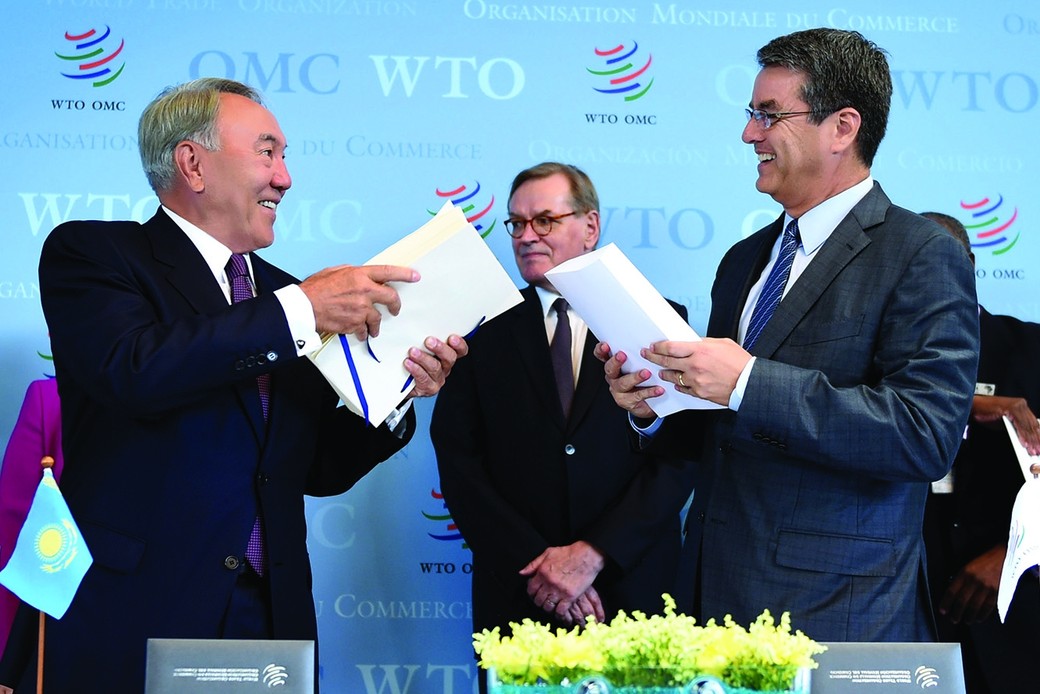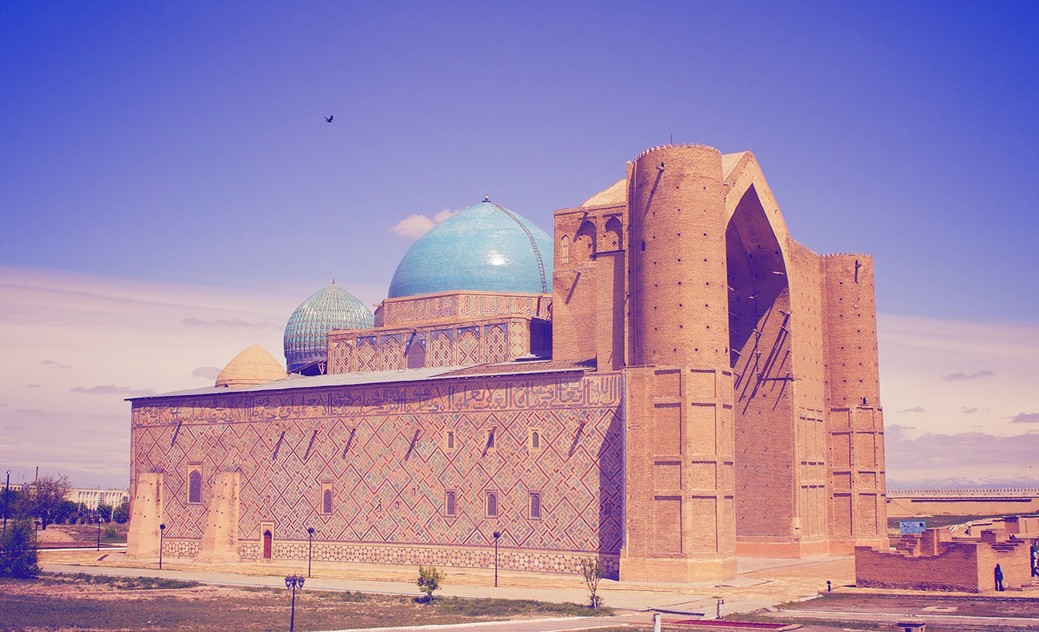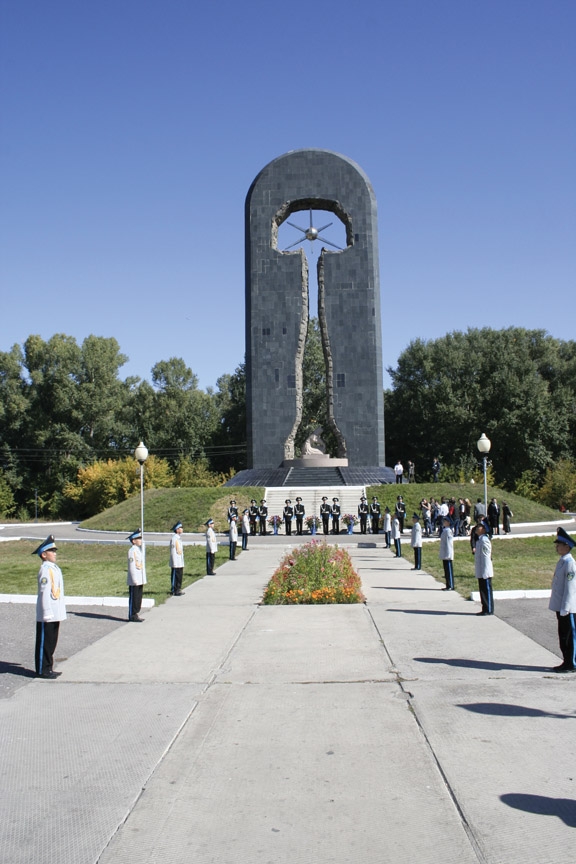
100 Steps for Kazakhstan
President of Kazakhstan Nursultan Nazarbayev and WTO Director-General Roberto Azevêdo at the ceremony of the signing of the Protocol on the Accession of Kazakhstan to the WTO in Geneva on July 27, 2015.
In May 2015, President of the Republic of Kazakhstan, Nursultan Nazarbayev announced one hundred concrete steps to further reform the country’s political, economic and social spheres. The new state Action Plan, 100 Concrete Steps, was designed against the background of worsening geopolitical and financial conditions around the world, including falling oil prices on world markets.
The Plan demonstrates an understanding that for sustainable growth and transition of Kazakhstan to the group of 30 most-developed nations, it must implement deeper reforms that will enhance the political, economic and social environment.
100 Concrete Steps focuses on five directions of institutional reforms. They are: improving public services, ensuring the rule of law, promoting economic growth, strengthening Kazakhstan’s identity and increasing transparency and accountability of the government.

Many of the identified reforms were proposed based on the experience of the world’s most developed states. In January 2015, Kazakhstan signed a country program with the Organization for Economic Cooperation and Development (OECD). A number of Canadian consultants were included in the group of international experts who traveled to Astana to discuss the issues of improving the competitiveness of the mining sector of Kazakhstan. Kazakhstan is going to increase transparency and predictability of the subsoil use sector by introducing the Committee for Mineral Reserves International Reporting Standards and will also introduce a facilitated contracting method for all mineral resources by using the best international practices.
The most advanced tools and standards of public services that are applied in Canada are going to be introduced within the framework of the 100 Concrete Steps. Open recruitment, enhanced training, salaries and promotions linked to work performance will be introduced. According to the plan, Kazakhstan is going to establish a national corporation, “Government for the Citizens,” that will become the provider of public services to the country’s growing population, similar to Canada’s public service.
In order to study the Canadian experience in these areas, two official delegations from Kazakhstan came to Canada in July. One was led by Member of the Mazhilis (the Kazakhstan Parliament), Maira Aisina and Vice-Minister of the Ministry of Investments and Development, Saken Sarsenov. The second was led by Chair of the Committee of Geology and Subsoil Use of the Ministry of Investments and Development, Bazarbay Nurabayev. In Ottawa, Kazakhstan representatives met with officials from the Treasury Board Secretariat, the Department of Employment and Social Development and were briefed on the operations of Service Canada and Shared Services In the Americas, it (Canada) is also a leading partner with more than seven billion dollars in bilateral trade between 2012-2014. Canada. They also had an opportunity to visit one of the Service Canada Centres.
Meetings with representatives of the Department of Natural Resources Canada and Canadian Institute of Mining, Metallurgy and Petroleum, and Export Development Canada allowed an exchange of views on the best practices in geological survey, resource exploration and development as well as application of international standards in this area.

Kazakhstan is one of Canada’s major trading partners among the post-Soviet and the Eastern European countries. In the Americas, it is also a leading partner with more than seven billion dollars in bilateral trade between 2012- 2014. According to the Department of Foreign Affairs, Trade and Development of Canada, the volume of Canadian investments in Kazakhstan amounted to nearly $16 billion during 1994-2013. There is no doubt that the successful implementation of the 100 Concrete Steps will contribute to The 100 Concrete Steps outlines measures to improve Kazakhstan’s economic performance by strengthening investors’ protection, eliminating red tape, ensuring tax transparency and additional support for entrepreneurs. Kazakhstan’s accession to the World Trade Organization (WTO), at the end of July, after almost 20 years of negotiations, was a great achievement.
According to Kazakhstan’s Minister of Foreign Affairs Erlan Idrissov, full membership of Kazakhstan in the WTO “underlines the country’s commitment to building a world class and diversified economy”. Kazakhstan is one of Canada’s major trading partners among the post-Soviet and the Eastern European countries.
In the Americas, it is also a leading partner with more than seven billion dollars in bilateral trade between 2012-2014. According to the Department of Foreign Affairs, Trade and Development of Canada, the volume of Canadian investments in Kazakhstan amounted to nearly $16 billion during 1994-2013. There is no doubt that the successful implementation of the 100 Concrete Steps will contribute to further broadening and strengthening of Kazakhstan-Canadian trade and economic ties.
In 2013, Kazakhstan achieved its goal to enter the top 50 most competitive countries according to the World Economic Forum rating. The country maintained this position in 2014. By outlining a goal of joining the ranks of world’s top 30 most developed countries through implementing major institutional reforms, the leadership of Kazakhstan remains committed to improving the wellbeing of its citizens and strengthening cooperation with its international partners.









